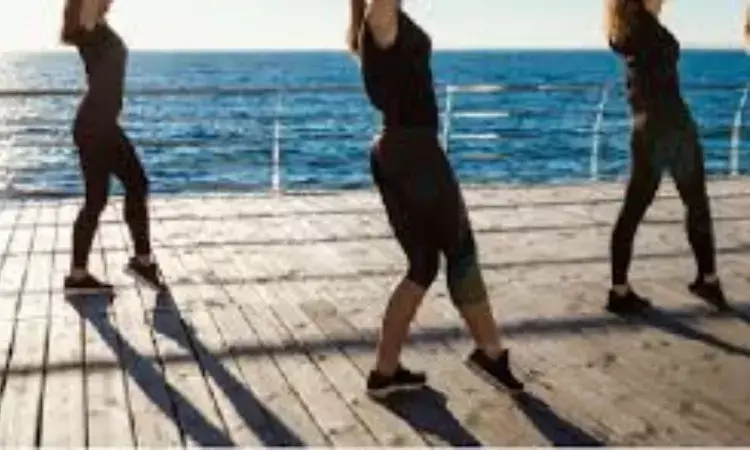- Home
- Medical news & Guidelines
- Anesthesiology
- Cardiology and CTVS
- Critical Care
- Dentistry
- Dermatology
- Diabetes and Endocrinology
- ENT
- Gastroenterology
- Medicine
- Nephrology
- Neurology
- Obstretics-Gynaecology
- Oncology
- Ophthalmology
- Orthopaedics
- Pediatrics-Neonatology
- Psychiatry
- Pulmonology
- Radiology
- Surgery
- Urology
- Laboratory Medicine
- Diet
- Nursing
- Paramedical
- Physiotherapy
- Health news
- Fact Check
- Bone Health Fact Check
- Brain Health Fact Check
- Cancer Related Fact Check
- Child Care Fact Check
- Dental and oral health fact check
- Diabetes and metabolic health fact check
- Diet and Nutrition Fact Check
- Eye and ENT Care Fact Check
- Fitness fact check
- Gut health fact check
- Heart health fact check
- Kidney health fact check
- Medical education fact check
- Men's health fact check
- Respiratory fact check
- Skin and hair care fact check
- Vaccine and Immunization fact check
- Women's health fact check
- AYUSH
- State News
- Andaman and Nicobar Islands
- Andhra Pradesh
- Arunachal Pradesh
- Assam
- Bihar
- Chandigarh
- Chattisgarh
- Dadra and Nagar Haveli
- Daman and Diu
- Delhi
- Goa
- Gujarat
- Haryana
- Himachal Pradesh
- Jammu & Kashmir
- Jharkhand
- Karnataka
- Kerala
- Ladakh
- Lakshadweep
- Madhya Pradesh
- Maharashtra
- Manipur
- Meghalaya
- Mizoram
- Nagaland
- Odisha
- Puducherry
- Punjab
- Rajasthan
- Sikkim
- Tamil Nadu
- Telangana
- Tripura
- Uttar Pradesh
- Uttrakhand
- West Bengal
- Medical Education
- Industry
Exercise and dance may help women overcome methamphetamine dependence: Study

China: Dance and exercise interventions may reduce subjective drug cravings compared to the control group in women with methamphetamine dependence, a recent study has found. The dance and exercise interventions compared to the control group showed a stronger preference for non-drug rewards (high-calorie foods).
The study findings, published in the journal Medicine & Science in Sports & Exercise, supports the use of moderate-intensity exercise as a therapy to restore the balance between drug and non-drug rewards by reducing cue-induced MA craving and increasing food reward.
Methamphetamine is a drug popularly used among women for its effects on weight loss and controlling depression symptoms. No approved drug currently exists to control methamphetamine use disorder. Though traditional exercise has been known to reduce drug abuse, dancing is being increasingly used as an intervention due to its unique ability to incorporate rhythmic motor coordination, emotion, and social interaction.
Against the above background, Y U Zhou, School of Psychology, Shanghai University of Sport, Shanghai, PEOPLE'S REPUBLIC OF CHINA, and colleagues aimed to investigate the effects of moderate-intensity dance and aerobic exercise on drug craving, prefrontal neural activation to food cues, appetite, and food reward in women with methamphetamine dependence.
The study included 39 women who met the Diagnostic and Statistical Manual of Mental Disorders, Fifth Edition MA dependence criteria. They were randomly assigned to either a dance (n = 20) or exercise (n = 19) group. The researchers conducted a moderate-intensity (65%–75% maximum heart rate) 35-min dance or treadmill intervention counterbalanced with a reading control session. Subjective drug craving was measured before and after exposure to drug-related cues following the intervention or control.
Subjective feelings of appetite were measured using visual analog scales. Participants then completed a visual food cue paradigm while using functional near-infrared spectroscopy to monitor prefrontal blood oxygen changes. Finally, the Leeds Food Preference Questionnaire was used to measure reward responses to different categories of food.
Following were the study's key findings:
- The dance and exercise interventions reduced subjective craving for drugs after being exposed to drug cues.
- Implicit wanting and relative preferences for high-calorie savory foods were all increased after interventions relative to control.
- Compared with the control session, the left dorsolateral prefrontal cortex was activated when viewing high-calorie foods after moderate-intensity aerobic exercise.
This study was limited by the inability to maintain a consistent heart rate during dancing as opposed to the treadmill. Nonetheless, these results highlight the potential therapeutic utility of exercise interventions for methamphetamine dependence.
"The current results support the use of moderate-intensity exercise as a therapeutic intervention to restore the balance between drug and nondrug rewards by decreasing cue-induced MA craving and increasing food reward," wrote the researchers.
Reference:
ZHOU, YU1; FINLAYSON, GRAHAM2; LIU, XUDONG1; ZHOU, QICHEN1; LIU, TIANZE3; ZHOU, CHENGLIN1 Effects of Acute Dance and Aerobic Exercise on Drug Craving and Food Reward in Women with Methamphetamine Dependence, Medicine & Science in Sports & Exercise: November 2021 - Volume 53 - Issue 11 - p 2245-2253 doi: 10.1249/MSS.0000000000002723
Dr Kamal Kant Kohli-MBBS, DTCD- a chest specialist with more than 30 years of practice and a flair for writing clinical articles, Dr Kamal Kant Kohli joined Medical Dialogues as a Chief Editor of Medical News. Besides writing articles, as an editor, he proofreads and verifies all the medical content published on Medical Dialogues including those coming from journals, studies,medical conferences,guidelines etc. Email: drkohli@medicaldialogues.in. Contact no. 011-43720751


